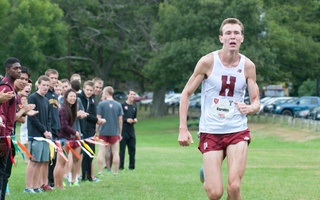It’s always bothered me when sportswriters liken a team’s season to a roller coaster ride.
The expression is overused and cliché, and I made a promise to myself when I started writing for The Crimson that I would shy away from those kinds of cheesy phrases that don’t actually mean anything.
But now, just eight months after my first article was published, I am going to break my promise and take a trip down Cliché Lane.
I feel forced to do this because following the Harvard men’s cross country team this season has felt like a trip to Magic Mountain.
Allow me to explain—to add meaning to this usually horrendous figure of speech.
At the beginning of the season, many spectators—myself included—thought that this was going to be a rebuilding year for Harvard.
The squad was returning sophomores James Leakos, Kurt Ruegg, and Maksim Korolev, and had picked up a top recruit in freshman Billy Orman. But in a sport that is entirely different at the high school and collegiate levels, I thought that the Crimson’s lack of experience would doom the squad’s chances of making a splash in the Ivy League.
In 2011, these guys would get a few races under their belts, learn how to cope with the increased mileage, and ultimately finish fifth or sixth in the Ancient Eight. It seemed to me that Harvard simply didn’t have the weapons to challenge Princeton and Columbia. Even Brown and Dartmouth would distance themselves from the Crimson’s talented, yet fledgling group of harriers.
Boy, was I wrong.
I headed to Franklin Park in mid-September to cover Harvard’s only home meet of the season: its dual meet against Yale. On that crisp, autumnal Saturday morning, I witnessed the Crimson’s absolute shellacking of the Bulldogs as it cruised to a 34-23 victory.
Leakos emerged as Harvard’s front runner that day. With nine other Crimson runners crossing the finish line within a minute of the first-place sophomore, the squad made one thing clear: this sure as hell wasn’t a rebuilding year.
For good measure, Harvard turned in an even more impressive performance two weeks later at the Paul Short Invitational. In a 45-team field that included some of the top-ranked teams in the country, the Crimson raced to a ninth place finish. Leakos once again was a standout performer, beating all Ivy runners and earning fifth place overall out of the 400-plus competitors.
Though Columbia showed why it is the favorite to challenge perennial power Princeton for the 2011 Ivy League title by finishing in third place, Harvard finished just behind Brown and Dartmouth in the team standings at the Paul Short Invite.
Third place in the Ancient Eight was a definite possibility. A bronze medal for a team whose top finishers had consistently been underclassmen didn’t seem like such a bad thing. I felt that the Crimson was on the up and up, that nothing could derail this team’s headstrong young runners.
Again, I was wrong.
Read more in Sports
Urke’s Rhythm Extends Beyond AthleticsRecommended Articles
-
Track News and Plans.About 145 men have reported for fall track work and of these about 45 are working on the cross country
-
Korolev Sets Ivy Record at HeptagonalsOn Saturday, for just the fourth time in 43 years, a Harvard athlete captured the individual title at the Heptagonal Championships.
-
 Co-Captains Leakos and Korolev Lead the Pack in Final Season
Co-Captains Leakos and Korolev Lead the Pack in Final Season -
 Korolev Qualifies for Cross Country Championships
Korolev Qualifies for Cross Country Championships -
Women's Track and Field Takes First at Heps, Men Place ThirdHarvard has another banner to raise as the women’s track and field team took the top spot at this weekend’s Heptagonal Invitational, making the Crimson Ivy League Champions for the second year in a row.
-
Three Compete at NCAA Indoor Championships for Track and FieldSeniors Maksim Korolev and James Leakos and junior Erika Veidis represented the Crimson at the national event.













